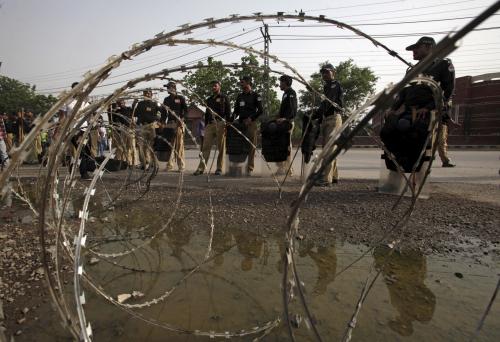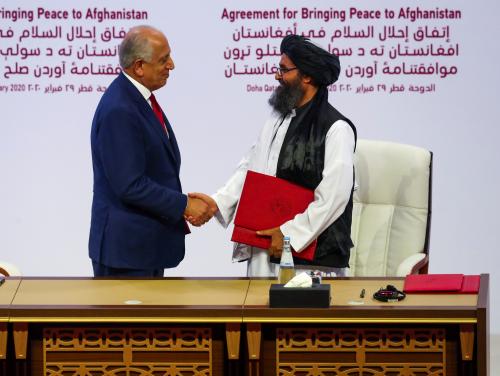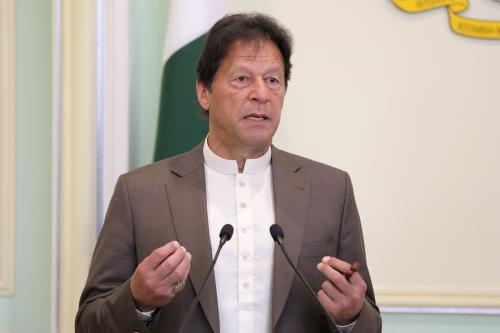After the unpredictability of the Trump years, Pakistan approached Joe Biden’s win and the new administration with both expectation and apprehension. It hoped that the administration would buy its pitch for a reset and for broadening relations beyond Afghanistan, but it worried about “baggage” that the Biden team could bring from its experience during the Obama years — the second half of which was a relative low point in the U.S.-Pakistan relationship. Nearly 100 days into the new administration, it appears that redefining U.S.-Pakistan relations isn’t going to be quite as easy as Islamabad had hoped, even as Pakistan concertedly pushes a new geo-economic vision.
President Biden has not yet spoken to Prime Minister Imran Khan. Nor did Biden invite Pakistan to a planned leaders summit on climate change later this month, though the leaders of India and Bangladesh will be there, and Pakistan was the only country among the world’s 10 most populous to not receive an invitation. Its absence is all the more pointed given Pakistan’s efforts to mitigate climate change, including its commitment to plant a billion trees. Khan claims he’s not bothered. Biden’s Special Envoy for Climate Change John Kerry, meanwhile, is currently in the region — visiting India and Bangladesh, but not Pakistan. Separately, Pakistan continues to play a key role in the Afghan peace process.
Trump took a transactional approach to Pakistan, which worked well in some ways. What Pakistan wants now is a relationship with the U.S. that is broader in scope, and includes trade and investment. Will Biden deliver?
What Pakistan wants
In recent months, Pakistan’s civilian and military leadership have together been promoting a new focus on “geo-economics” — an approach that emphasizes regional trade and connectivity, and stresses that Pakistan is open for business. The new focus recognizes that a geostrategic approach only goes so far, and if Pakistan is to rise on the world stage (as its neighbor India has done), that position will have to be predicated on economic growth.
In tandem, Pakistan says it wants to co-exist with its neighbors and wants a peaceful outcome in Afghanistan. It seeks a potential détente with India: In February, the two agreed to honor a 2003 ceasefire agreement along the Line of Control in Kashmir, and there might be more in the offing on a rapprochement. In a recent speech in Islamabad, Pakistan’s chief of army staff, General Qamar Javed Bajwa, notably said: “We feel that it is time to bury the past and move forward.”
Pakistan also wants a more broad-based relationship with the U.S., one that goes beyond strategic concerns and the war in Afghanistan. It is conveying openness to the West, with its leadership stating that the country’s economic fortunes are not wedded to China — and the $62 billion China-Pakistan Economic Corridor (CPEC), a flagship project of China’s Belt and Road Initiative — alone. In his speech last month, Bajwa said: “While CPEC remains central to our vision, only seeing Pakistan through CPEC prism is also misleading. Our immensely vital geostrategic location and a transformed vision make us a country of immense and diverse potential.” Pakistan’s foreign minister has also said as much: “[Americans] have to understand that our relationship with China is not a zero-sum game for them. They should come, compete and invest.” The problem with this pitch is that Pakistan’s regulatory climate is less than ideal for investors.
The foreign minister and other officials have also suggested that Pakistan can serve as an interlocutor in the U.S. relationship with China, harkening back to an approach that worked well half a century ago. But in 2021, the U.S. likely won’t take Pakistan up on this.
A tough start
Pakistan’s relationship with the Biden administration got off to a bumpy start. On January 28, Pakistan’s supreme court upheld a lower court’s judgment acquitting Omar Saeed Sheikh, the man convicted of masterminding the kidnapping of Wall Street Journal journalist Daniel Pearl in 2002 — a kidnapping that led to his murder. The Biden administration swiftly denounced the court’s decision, calling it an “affront to terrorism victims everywhere, including in Pakistan,” adding that the U.S. expected “the Pakistani government to expeditiously review its legal options to ensure justice is served.”
The decision came the day before Secretary of State Antony Blinken’s first calls with the foreign ministers of India and Pakistan. The juxtaposition of the two readouts presented a sharp, unavoidable contrast. In his conversation with Pakistani Foreign Minister Shah Mehmood Qureshi, Blinken focused on America’s concern with the Sheikh judgment; in his conversation with Indian Minister of External Affairs S. Jaishankar, he emphasized the importance of the U.S.-India relationship moving forward.
The Afghanistan factor
The Biden administration looks at Pakistan through the lens of Afghanistan, much like the Trump administration did. Special Envoy Zalmay Khalilzad continues his regular visits to Islamabad and the army headquarters in Rawalpindi for discussions on the peace process. But while the Trump administration privileged Pakistan over all other third parties on Afghanistan, the Biden administration hasn’t done so. In a leaked letter to Ghani, Blinken notably mentioned India and Iran as well as Russia, China, and Pakistan as countries that could help in the peace process. The mention of India, in particular, worries Pakistan. Ultimately, at the troika-plus-one (China, Russia, and the United States, plus Pakistan) talks on the Afghan peace process that were held in Moscow last month, Pakistan was the “plus one,” but it seems likely that India will play a greater role going forward than it has in the past few years.
The dilemma is that the U.S. wants more from Pakistan on Afghanistan, including to try to get the Taliban to agree to a ceasefire. Pakistan insists that it is doing all that it can, that it has already done a lot by bringing the Taliban to the negotiating table, and that there are real limits to its leverage over the group. There is truth to those limits, given that the Taliban has evolved away from Pakistani control since the 1990s, and Pakistan’s influence over Taliban field commanders, in particular, may be a lot less than we imagine. While Pakistan wants to retain its key position in the Afghan peace process, one it attained precisely because of the leverage it has over the Taliban, Pakistanis tend to begrudge the demand to “do more” to rein in the Taliban, particularly after the U.S. negotiated a peace deal with the group. Across recent U.S. administrations, of course, the thinking has been that Pakistan’s support for the Taliban (including sanctuaries for the group in Pakistan) caused the United States to lose the war in Afghanistan. The two countries continue to see past each other, bedeviling the relationship.
Through it all, the U.S. ends up privileging Pakistan’s military — its usual partner and the one institution in Pakistan it perceives as effective — over its civilian officials.
The Biden administration
Biden knows Pakistan well through his years on the Senate Foreign Relations Committee and as vice president. Pakistanis had hoped that that would be enough for a reset and for widening the scope of the relationship, but the reality is that Biden is too busy elsewhere — with more pressing concerns both domestically and abroad — to focus on Pakistan beyond the Afghanistan issue, at least for now. Pakistani officials have acknowledged privately that the Biden administration “was not giving encouraging signals.”
Washington will likely continue to see Pakistan through the prism of countries in its neighborhood: Afghanistan, India, and China in particular. Paradoxically, Trump’s unorthodoxy had soothed some of Pakistan’s fears; its leaders felt for a time as if America’s relationship with Pakistan was decoupled from its relationship with India. That feeling is unlikely to last. In Pakistan, the old perceptions that Republican administrations are better for it than Democratic administrations and that the U.S. favors India at Pakistan’s expense are never far from the surface.
The legacy of the Obama years likely weighs heavily, and not just on the issue of Afghanistan and safe havens for the Haqqani network in Pakistan, which became a sticking point in the relationship during Biden’s time as vice president. The Navy Seal raid on Abbottabad in May 2011 that killed Osama bin Laden marked a low point during those years. For Pakistan, this raised the issue of sovereignty. For America, the episode laid bare a greater issue: that it could not trust Pakistan, and the Obama administration’s relationship with the country never recovered from this. (Pakistanis have their own grievances from that year, when a CIA contractor, Raymond Davis, shot and killed two Pakistani men in Lahore, and a NATO attack in November accidentally killed 24 Pakistani soldiers.)
Looking ahead
Pakistan has made it clear that it wants a different relationship with the U.S. But what’s equally clear is that the United States isn’t buying its new geo-economic pitch quite so easily. Part of this is because it is unrealistic: Pakistan doesn’t yet have the economic depth needed for this new approach. But it would still be useful for the Biden administration to look beyond its singular Afghanistan lens at Pakistan. The country has changed since 2016; it knows it needs a new paradigm, and business as usual is not enough. This presents a good time to rethink U.S. engagement with Pakistan. Climate change would have been an obvious new issue on which to cooperate, and not engaging with Pakistan in that arena could be a missed opportunity.
For a new approach for getting the relationship to work, both countries will have to do more to meet each other somewhere in the middle. The Biden team needs to keep an open mind and look at Pakistan with a broader lens. And if Pakistan doesn’t want strategic concerns to dominate its relationship with the U.S., it needs to offer up something more than words: real economic incentives.








Commentary
Under Biden, Pakistan and the US face a dilemma about the breadth of their relationship
April 12, 2021